10 Music Reviews
About, Bongo (Cock Rock Disco)
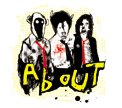
There's men with cartoon animal heads playing guitars on the inside cover of About's album Bongo. The perfect image, not because About are a rock band, but because they're a cartoonish, pop-art approximation of one, in 21st century terms. That is, About is one man, Rutger Hoedemaekers, screwing around with computer and instruments til he's come up with a Ferris Wheel's worth of giddy tunes, jump-cut rhythms, and the sound of guitars that have changed their minds and turned into robots. He sings playful, faux-aggressive lyrics in the voice of a comic book character who's joined a New Wave band. There's running themes of identity and art and who you create yourself to be, and About is constantly evoking rock n' roll, through cut-up rock-guitar sounds and titles like "Stack of Marshalls," only to dismiss it, or at least turn it into a big colorful blur of colors and pop goofiness. The high-speed "Furry Dice (Dangling from the Guitar" resembles Atari Teenage Riot if they were actually fun, "She Knows Everything About All Who Ever Drank Cofeee With Her" mocks infatuation songs while jamming up this great reggae-pop lilt (in under 50 seconds), the drunk brass-band slow dance "Friends Applaud The Comedy Is Over" manages to be touching without making sense, and the rumble-jumble "Boo (Hoo)" is the catchiest dance-club track I've ever heard, without really being one. All in all, a brilliant madcap party with a strikingly pop approach to tearing music apart and building something new and weird. – dave heaton
The Darling Downs, How Can I Forget This Heart of Mine? (Carrot Top)
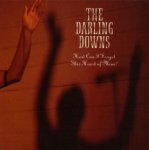
The cover of How Can I Forget This Heart of Mine? is this great shot of the silhouette of singer Ron Peno with his arms stretched above his head, looking like he's testifying or conjuring up ghosts. Both those interpretations are valid for the album, which has this absolutely stark setting and beautiful lonely presence that's haunting and inspiring. Not the rock album you might expect from a collaboration between Peno (former Died Pretty lead singer) on vocals and Kim Salmon (The Scientists, etc.) on guitar, it's instead this ghostly, late-night country-folk album. Peno's singing brings to mind high-lonesome country performers from ages ago (literally soaring into the heavens on songs like the spellbinding "In That Jar"), while Salmon's guitar provides a bare, spare road for it to travel on. The songs' subjects are like the essence of old-time country: loneliness, betrayal, feelings of home, deep abiding love. It's like the Darling Downs have attempted to take this style of music and strip it of anything but its essence - strip it of decoration, of fashion, of time, even. They're left with music that doesn't feel of a particular time or place, except the now: a heartwarming, heart-burning experience. - dave heaton
Darling New Neighbors, Every Day Is Saturday Night (Darling New Neighbors/I Eat)
The Austin, Texas band Darling New Neighbors' album is called Every Day Is Saturday Night, and it sounds like that's true, that for them every day is a Saturday night, not because their music has non-stop crazy energy, but because they're not taking what they do too seriously. There's a laidback, offbeat kind of playfulness to their style of country-folk music that makes it feel like a party, starting with the lazy swoon of opening number "Overgrown," which uses gardening metaphors to describe failed love affairs, and continuing all the way through to the closing live track, "Piece of Ass," a minute-long excerpt of a violin-led freight train ramble about a love that boils down to "an ass that just won't quit." Love is often the subject matter here – it's never simple, never quite working out right, but always a compelling force. There's a push-pull at work between people in songs like "The Best You Can Do" and "The Time Is Come," though the circumstances are somewhat enigmatic. Musically their music has a fair amount of struggling among forces – styles and genres – and that's what keeps it interesting and entertaining. Old-time country shuffles run headlong with bluesy rock, accordion-tinged folk jaunts, and an almost punk-like warped tone (the Raincoats come to my mind in a couple places, and I'm always surprised by that cause on the surface they have little in common). Singer Elizabeth Jackson warbles like an old-fashioned country singer, and her voice has this nice slanted, slightly off quality at times. The whole affair is kind of loose, kind of crazy, a lot of fun, and completely satisfying, like the best sort of Saturday night. – dave heaton
Depth Affect, Arche-Lymb (Autres Directions in Music)
Depth Affect's Arche-Lymb starts off like modern electronic pop music deeply influenced by old-school hip-hop. The breezy opening track "Honey Folky" sounding vaguely like an Air-like song layered over a golden-age rap track, and the second track "One Day," opens with a few piano notes that make me think of "The Symphony", and of the nostalgic feeling of a track like the Ice Cube "It Was a Good Day" song, before Cyne comes out spitting rhymes about gun violence and materialism over future-world production. As the album proceeds, it gets more and more of a lazy-day-spent-dreaming-of-the-future vibe, sunshine electronics that lie back into the dreamy state of an afternoon nap in the countryside. There is where "honey folky" begins feeling like an apt description. It's like no folk music you've heard before, though, as the dominant textures are more that of chopped-up electronics and broad synthesizer strokes. And hip-hop's never far away either. Depth Affect is always turning a corner and dropping into a funked-up stroll, or throwing in samples, like ODB's voice showing up on "OD-MF-Side." Depth Affect takes on experimental electronic music, hip-hop, and lightly psychedelic folk music, but the three are never discrete categories, always part of the same whole. The mix among them gets incredibly subtle, as on "Vladgorythm Suicide," when the music drops to a gentle whisper and in the distance you can hear traces of an old-school block party. It's hip-hop that's made invisible as often as it's blared full-blast…folk music that emulates pastoral scenes, but those of another planet….and electronic music that's inclusive, warm, and never in any way distanced or cold. A remarkable, beautiful hybrid of styles – beat-driven music that dreams of some sunny future, and creates it. – dave heaton
Robin Guthrie, Continental (Darla)

Sometimes it might seem easy to boil the Cocteau Twins' music down to some simple description like 'dreamy swirls of sound', but listening back to the actual albums shows how unfair that would be, how much richness and depth there was to their sound. Similarly, a new instrumental album from Cocteau Twins co-founder Robin Guthrie is likely to be summed up as just an extension of that description, as an after-the-fact notation to the band's discography. But again, do that and miss out on some rich, involving, gorgeous music…music that can't fairly be summed up with a one-setence or couple-word description. Continental certainly shares that transcendent, bliss-out tone of the Cocteau Twins discography, but it's also a patient, sprawling soundscape that presents an atmosphere vivid enough to stick with you. There's no simple rush of energy, no explosions, yet as the music unravels it wraps itself around you, reveling in a radiant assortment of guitar textures and gentle piano tones. Instruments are woven into an aural approximation of sunlight, but then after the bright feeling catches your ear, it turns to reveal other feelings and dimensions: some longing, some awe, some sadness even. It's an emotional soundtrack, full and varied. And as an instrumental ambient/post-whatever album, it stands right there with the best works from the younger musicians who have followed in Guthrie's footsteps. – dave heaton
Jane Vs World, 56K Hearts (Pop Boomerang)
"I Used to Write Bad Poetry," a song on Jane Vs. World's 56K Hearts EP, and yes that's because the group is made up of two teenagers. Kate Duncan and Jadey O'Regan used to write bad poetry ("about this 'abyss of loneliness I feel'") and now they write catchy, kind of goofy pop songs about boys who like emos and Jack Kerouac novels. If you want earth-shaking, 'innovative' music go elsewhere, but this EP's a lot of fun, for the hooks and melodies but also playful lyrics about things like chatting online with a boy from Canada. That seems to be the main topic for the EP, actually, or at least the source for two of the songs. Most of this is just silly fun, with a bright demeanor and lots of ba-ba-ba harmonies, though of course there's some good old teenage sadness and hurt peeking out here and there. – dave heaton
Microesfera, Negative (Static)
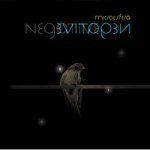
Microesfera's Negative album is a continuous grove: a seamless, flowing funkstream that you can't listen to without moving. It's physical music, music you feel in every body part, and also beautiful music, colorful and sleek. Those qualities are perhaps why the duo (Alejandro Amo and Ramiro Larrain) has long been popular among techno fans in their hometown of Buenos Aires. What's remarkable about Negative, though, isn't just that it's alluring, compelling dance music – as if that weren't enough, there's also so much more going on within their impressively minimalist soundscapes. Minimalist this music is; sometimes it feels like they're bringing music down to an essential three or four parts. But it's also complex, as there's a spectacular array of sounds – some percussive, some melodic, some on their own almost dissonant – found in each track. So many unique and interesting sounds are composed together in an intricate, provocative way, all within this rolling river of rhythm. This is body music, but so much more. – dave heaton
Bobby Previte, The Coalition of the Willing (Ropeadope)
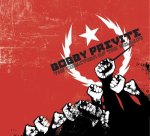
Bobby Previte's new album The Coalition of the Williing has the look of propaganda, Soviet perhaps, with raised fists on the cover suggesting revolution, and titles like "The Ministry of Truth" joining with the liner notes proclamation "Wake Up Everybody," and accompanying 1984 excerpt suggesting the album's an examination of our modern-day Big Brother society. All that's well and good, but it's mostly outside the music itself. Though the album starts off sounding strident enough to indeed suggest rebellion, what's mostly here is tight, funk-soul-blues-rock-driven jazz jams from a band of whippersnappers, all veterans of varying ages. Bobby Previte wrote and arranged all the music, and his skills on the drums are on display here. But the other musicians are no slouches, and are just as often right there in the forefront of the group's sound: Charlie Hunter on guitars, Jamie Salft on organ and bass, and occasionally a few notable others on horns, drums, and harmonica. The music is fiery and dark, often pointing towards a jazzier version of Funkadelic's evil blues. It's intoxicating, heady stuff – music that grooves deeply. – dave heaton
Scott Solter, One River (Tell All Records)
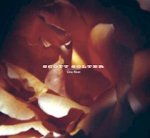
A river of sound is what Scott Solter's ambient moodpiece One River resembles. It's an involving experience, music that evokes a very particular mood yet has many dimensions to it. At first when you listen you hear the overall sound - this slowly flowing entity, with gently repeating tones and a soft surface. You listen closely, though, and a whole array of sounds peek out and disappear. Sounds like bells, like a high singing voice, or is this an instrument? There's even some kind of farm equipment in one place, or maybe that's not what it is...these sounds appear and instantly leave, or do they? It's hard to tell what all is going into this elixir, and what's really there versus what I'm imagining. "Bowed cymbals, guitar, tape undercurrent, voice" are mentioned as instruments - a mysterious grouping that brings more questions than answers. But I'm not that interested in technique, in exactly who's doing what. What's interesting to me is this spellbinding, really amazing, music that has come out of it. Like the best ambient music it's the perfect unobtrusive soundtrack to life and it's a remarkably detailed, complex work that generates a multitude of feelings, impressions, and ideas. - dave heaton
Hayley Taylor, Waking (self-released)
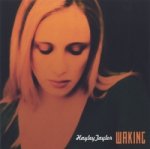
Pretty much every week at least one CD will come my way that's explicitly person-centered...that is, it's made by one person, and the cover art includes several photographs of that person. "Singer-songwriter music", is, I guess, the proper way to describe it. It can get hard to distinguish them, and sometimes easy to substitute one for the other before listening. Hayley Taylor's six-song CD Waking is one of these at first glance, there's nothing about the cover that would slap you in the face and say "listen to me!" But listening even once reveals more talent and heart than your average singer-songwriter, one-person-and-a-guitar type of music. And look again at that cover, look inside: there's a collage of family photos that should point you to the fact that this isn't self-focused music, it's human music, about the feelings and experiences of us all. Taylor's songs quietly probe the human condition, From the opening plea for understanding about where a relationship stands ("Orange Tree") to the closing realization song "What Matters Most," the search for connection, for love, is the focus, but it's always handled in a straightforward, heartfelt way, free of clichés. And the songs themselves are gently melodic, never over-dramatic or showy, but all quite involving and compelling, with a lost-in-your-thoughts mood softly accented by pedal steel, cello, and wurlitzer. - dave heaton
Copyright (c) 2006 erasing clouds |
|